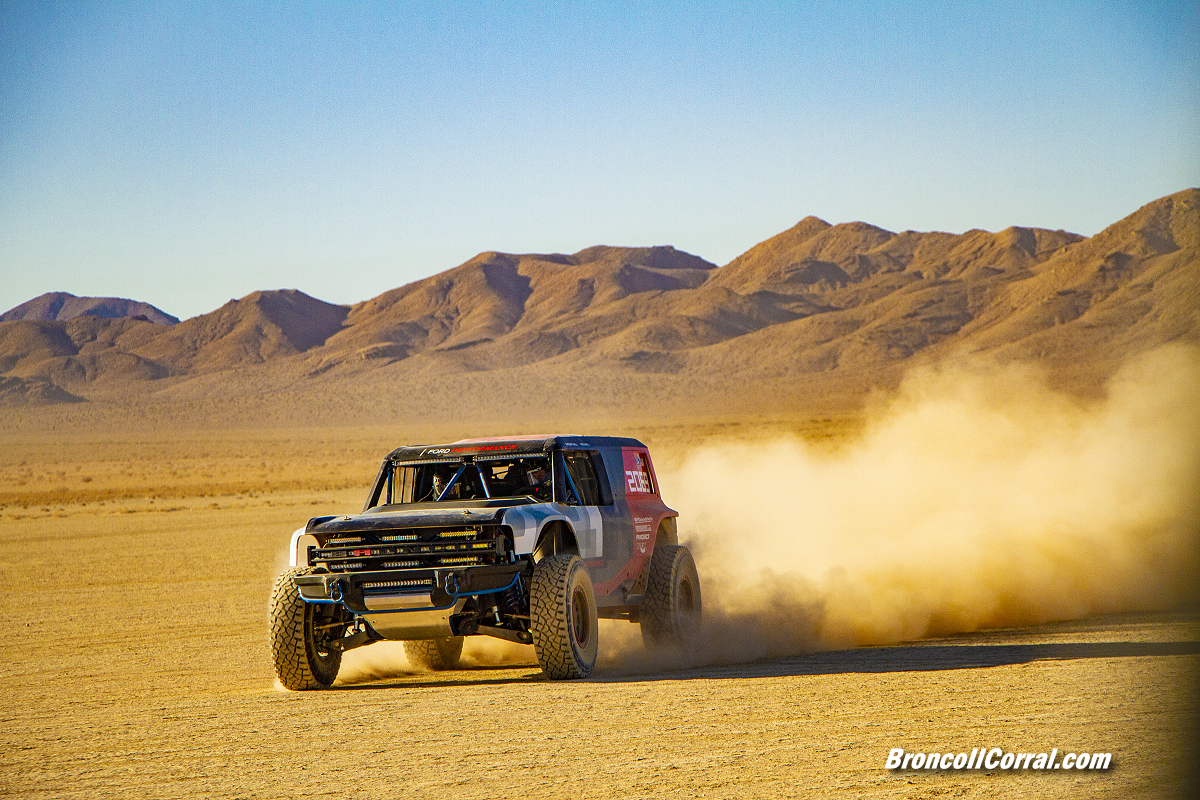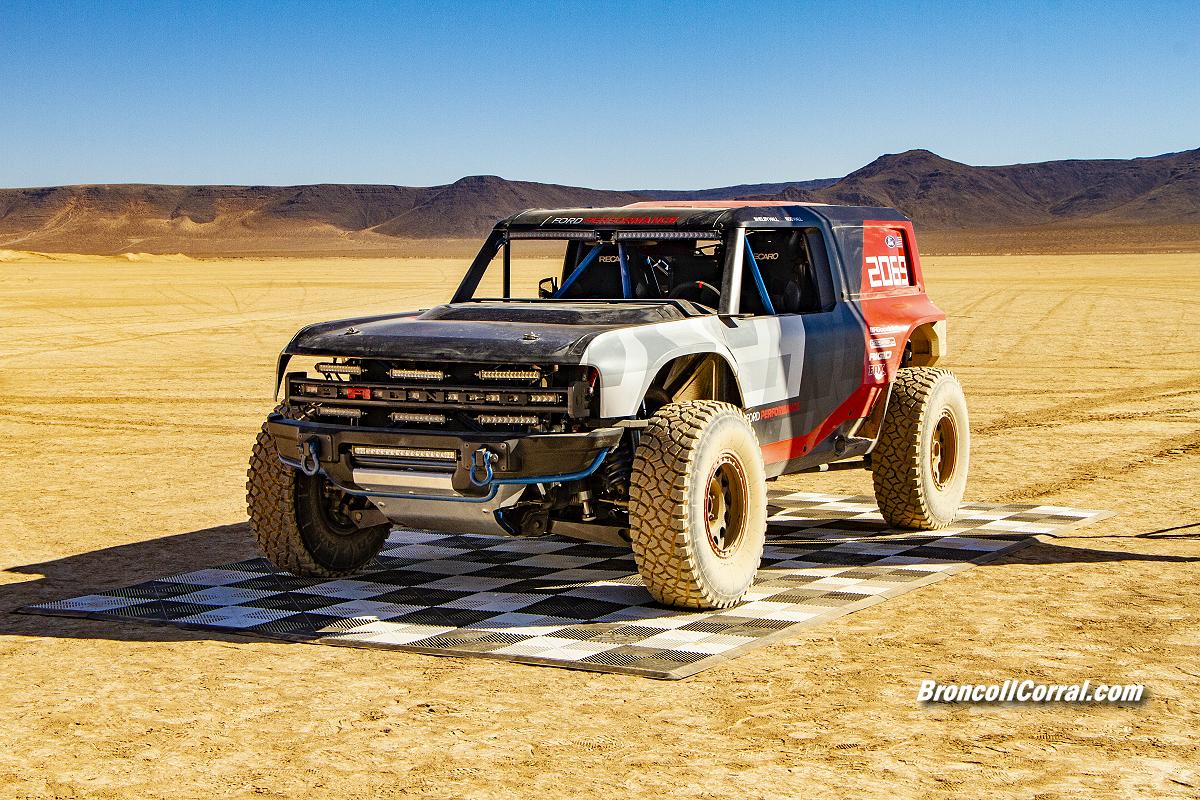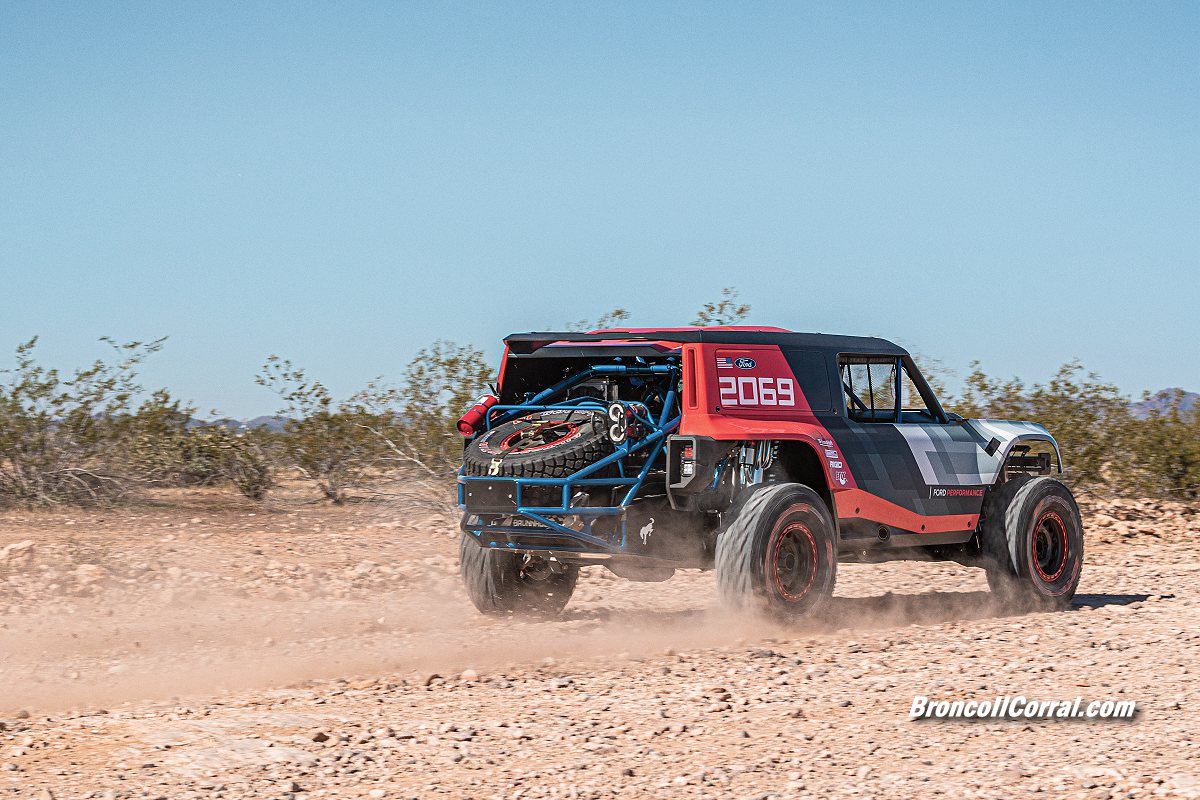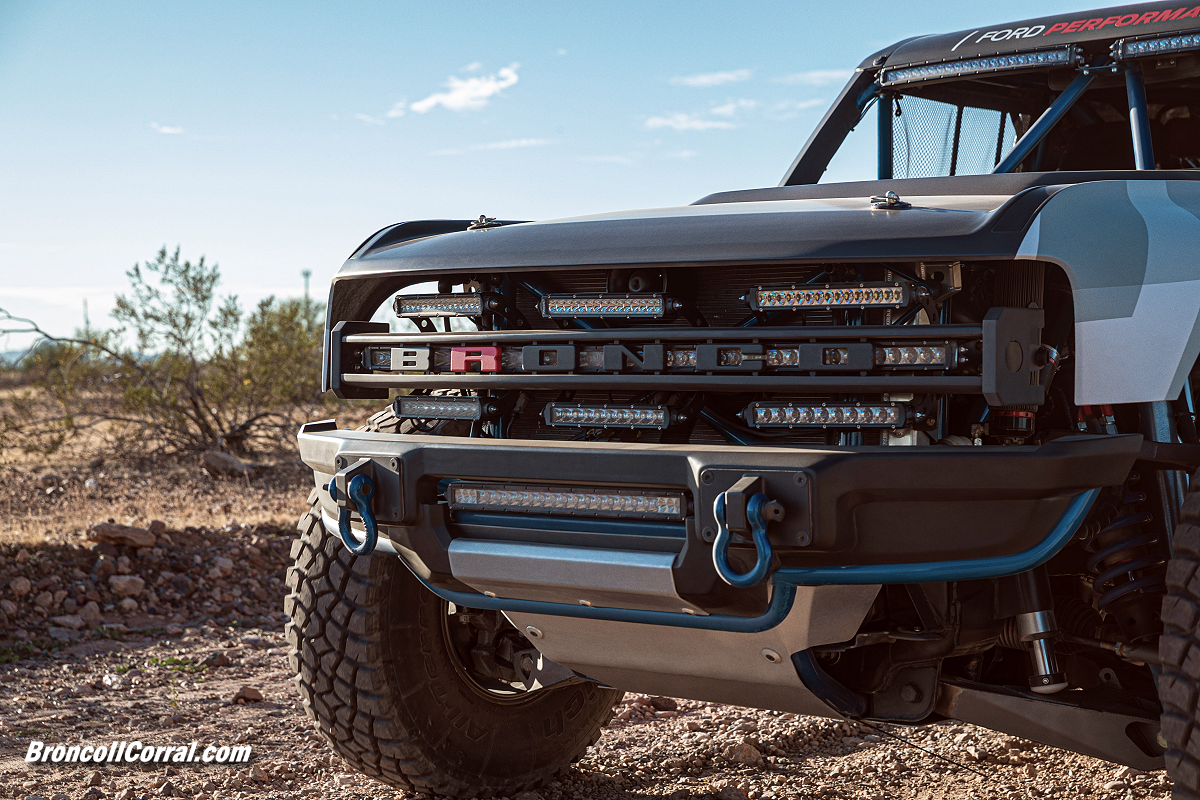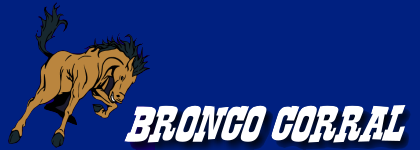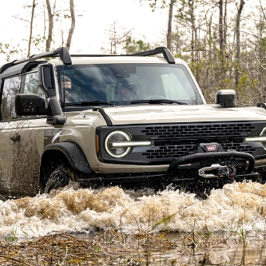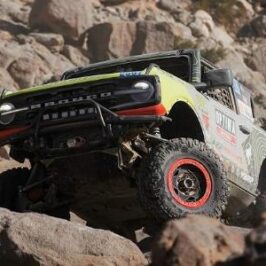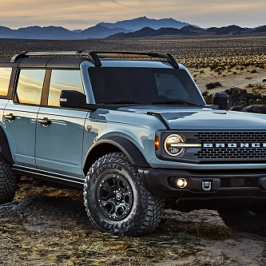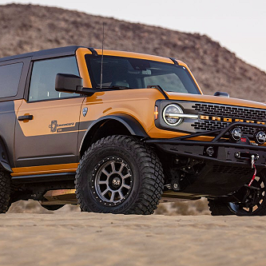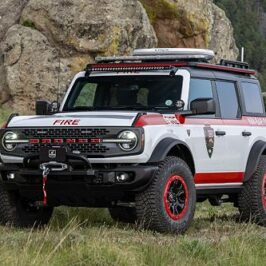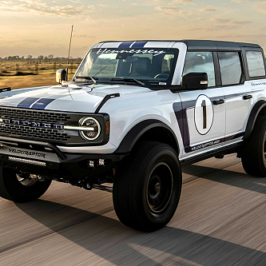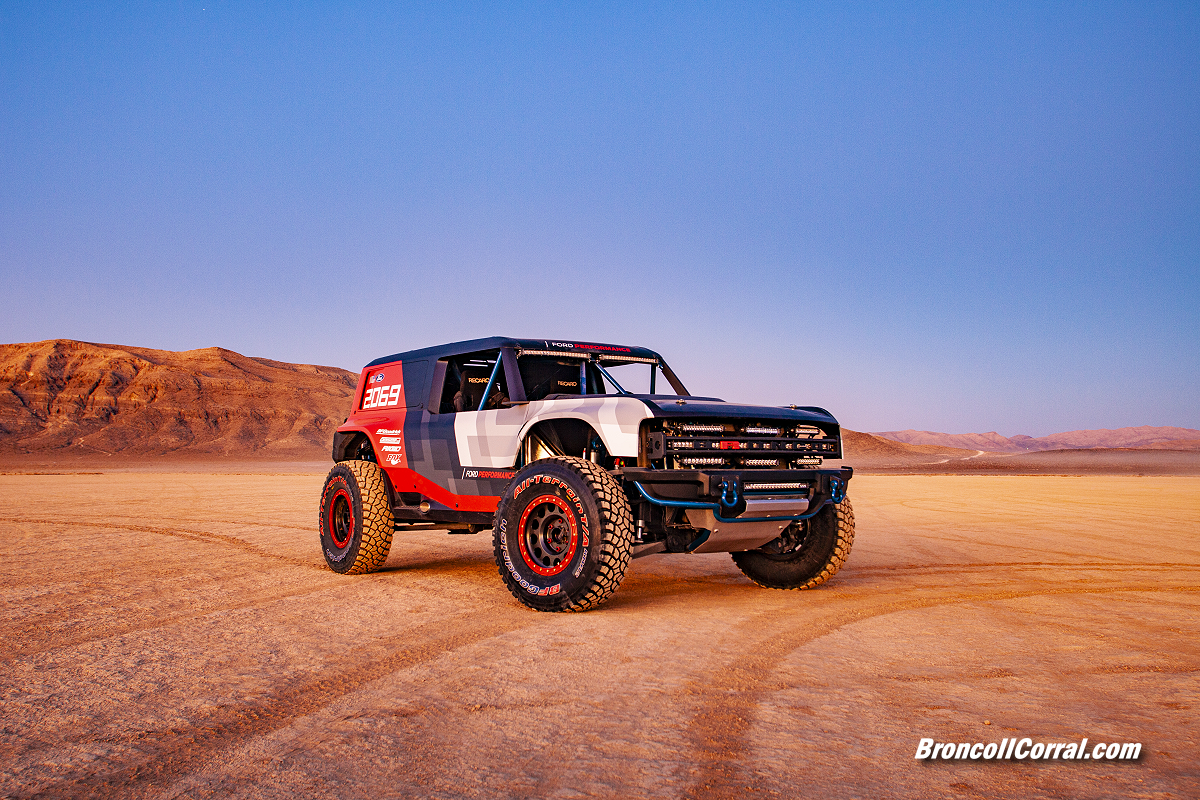
Hinting at upcoming Bronco production model, Ford’s Bronco R race prototype debuts in the desert to celebrate 50th anniversary of Rod Hall’s historic Baja 1000 win, an overall victory in a 4×4 that’s never been duplicated in 50 years.
It was built for this, its engine roaring through the heat of the Mojave and its racing tires spraying desert sand. As the last grain settled, the vehicle that is all at once a tribute and a test and a tease, came in to focus. It was no mirage. Bronco – in the form of a race-inspired Bronco R prototype – is back.
As a tribute, it was appropriately parked alongside the Bronco that Rod Hall and Larry Minor famously drove to an overall win 50 years ago at the 1969 Baja 1000 – a victory that no other 4×4 has replicated. Featuring a race livery inspired by Hall’s winning vehicle, Bronco R passes the torch to off-road racer Shelby Hall, Rod’s granddaughter, who will drive it for portions of this year’s prestigious race in honor of her late grandfather.
As a test, the Bronco R will head back to the Baja Peninsula later this month to take on the near 1,000-mile grueling off-road course and challenge the production Bronco’s powertrain and architecture.
And as a tease, the Bronco R – developed by Ford Performance in collaboration with builder Geiser Bros Design and Development and Baja 1000 Trophy Truck champion Cameron Steele – drops heritage-inspired design and proportion hints of what enthusiasts can expect to see when the future Bronco makes its world premiere next spring.
“Bronco’s win at Baja in 1969 was epic, something that even after 50 years has not been repeated,” said Hau Thai-Tang, Ford chief product development and purchasing officer. “Rugged endurance racing is such a big part of Bronco heritage. The Baja 1000 gives us not only the perfect setting to honor Rod Hall’s win, it also provides an authentic test bed to demonstrate our upcoming Bronco’s desert racing capability and durability.”
Iconic Bronco design at first sight
Hidden behind an innocuous security door in a Ford studio basement, a small team led by Paul Wraith, Bronco chief designer, worked since July to make the race prototype unmistakably Bronco at first sight. The team worked in secret to create a one-off build that hints at the all-new Bronco to come, while paying homage to the first-generation Bronco’s styling and proportions that made the nameplate an instant off-road icon a half-century ago.
The team focused on creating a race-ready look with an overall heritage-inspired design language. With its compressed body height and long-travel suspension, Bronco R features an ultra-wide stance, while a variety of aero components reinforce its performance intent. The prototype’s lightweight composite body includes a clamshell hood and roof, as well as clean body panels that harken back to the first-generation Bronco models (1966 – 1977). A cut-roof design allows rear seat passengers to use a second-row hatch for access.
The exterior incorporates 15 LED lightbars from Rigid, including a grille sequence framing the new BRONCO brand lettering boldly. To underscore that this is a one-of-a-kind racing prototype, the “R” is given a sharp graphic treatment. Washers inscribed with the Bronco name are visible at various points around the exterior and secure the composite skin to the roll cage beneath it.
A unique race-focused interior features lightweight off-road racing shells from Recaro for all three seating positions. Simple surfaces of the instrument panel nod to the first-generation Bronco, and the integration of a MoTeC data acquisition system enables real-time monitoring and measurement of the prototype’s performance attributes.
With its exterior inspired by the winning 1969 Baja 1000 Bronco livery, the Ford Performance Bronco R race prototype pays tribute with its red, white and black colors accented by its blue space frame. No. “2069” stretches across its rear quarter-panel and wing – “20” to signal the class in which it will race and “69” in honor of the year in which Hall and Minor roared to an overall victory in the Mexican 1000 (now SCORE-International Baja 1000).
“My grandfather was so proud of the 1969 Baja race and of his Bronco,” said Shelby Hall. “More than just the memory of winning Baja, he loved that Bronco. I have no doubt he would be blown away by the Bronco R race prototype.”
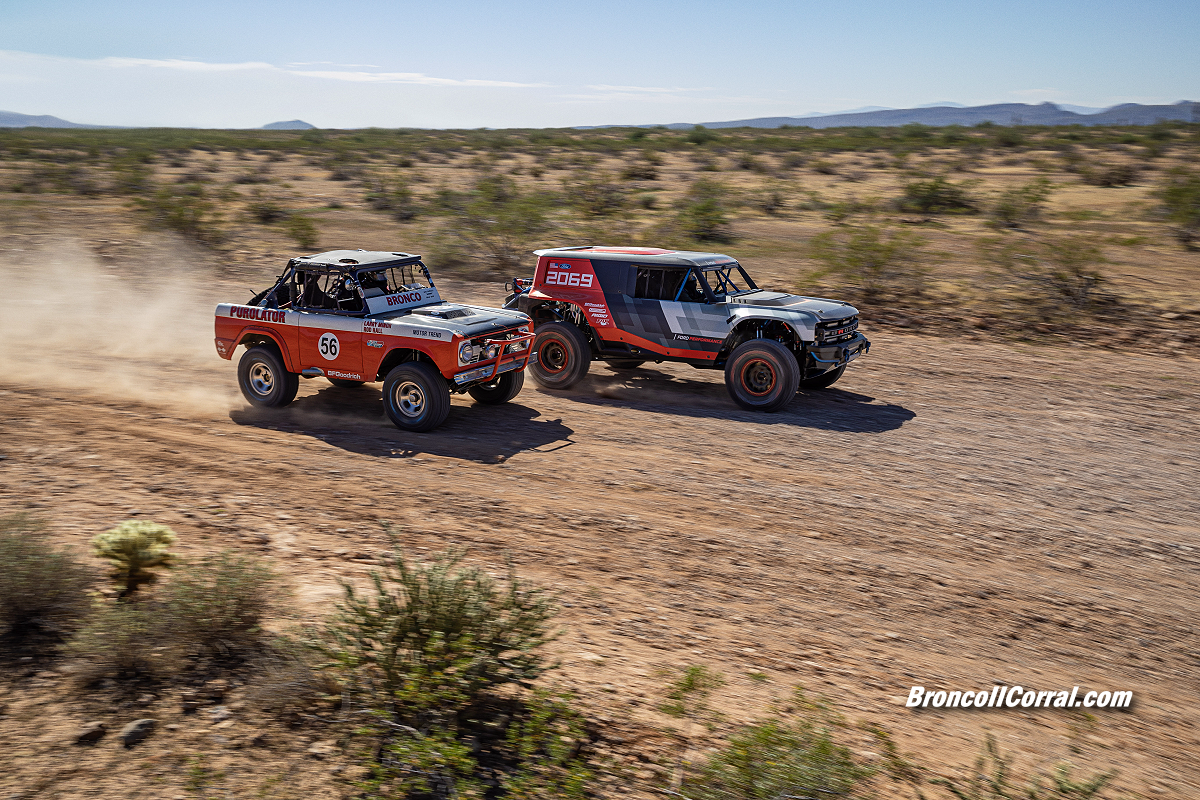
Sketch to race prototype in six months
To mark the 50th anniversary of Bronco’s Baja 1000 win, Wraith and team worked in concert with Ford Performance, builder Geiser Bros Design and Development of Phoenix, Arizona, and Baja 1000 Trophy Truck champion Cameron Steele to make the Nov. 22 race start. They used cutting-edge tools such as high-tech virtual reality, polygon modeling and 3D printing to develop parts, but also incorporated low-fidelity prototyping and role-playing to aid problem-solving and swift decision-making.
“This wasn’t our usual development process, but it was the right process for this project,” said Wraith. “We found, created or adapted the right tool for the task at hand – a cool and exciting blend of old and new creative techniques. We stretched ourselves, but it was worth it – and great fun.”
More than a celebration of Hall’s 1969 win, the Bronco R race prototype is designed with the production model’s body-on-frame architecture to test its capability and durability, while also energizing off-road enthusiasts who eagerly await the return of America’s original sport utility vehicle.
The race prototype is built on a modified Ford T6 architecture that will provide the base for the production model. Beefed up for Baja, Bronco R features an independent front suspension with 14 inches of travel and a production-based five-link rear chassis design with up to 18 inches of travel, plus custom Fox shocks, 17-inch beadlock-capable aluminum wheels and 37-inch BFGoodrich tires.
“Like the original Bronco, we kept Bronco R’s design authentic and simple, with a roll cage on a production-style frame, and a five-piece lightweight body on top,” said Brian Novak, Ford Performance off-road racing supervisor. “For the endurance needs of Baja’s 1,000 grueling miles, we built in a limited number of race-focused parts. But even the twin turbos of the EcoBoost® engine are representative of what the production Bronco will offer.”
For the vehicle that was, and the vehicle that will be – it’s the vehicle that is. The Bronco R race prototype is no mirage. The sand is flying again, and the heat is on. It was built for this.
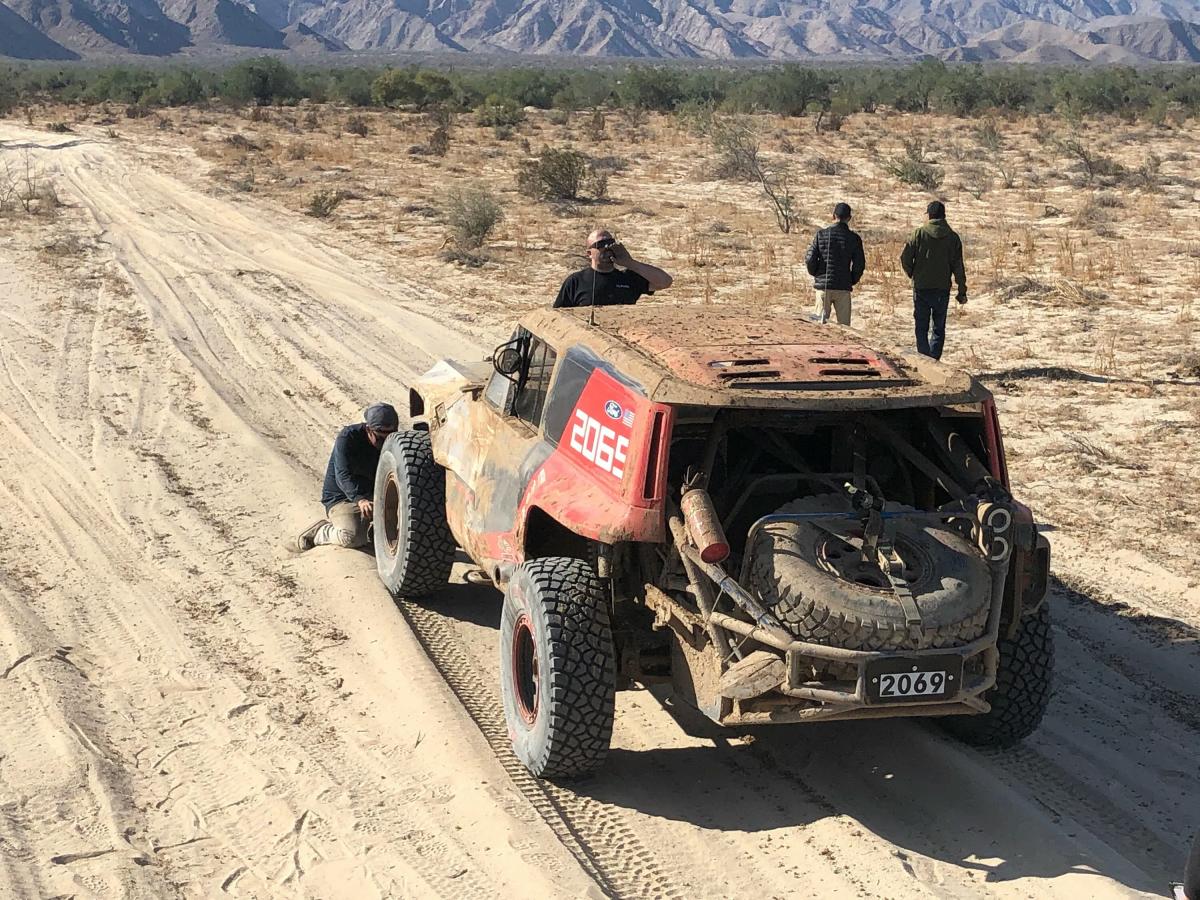
Baja – Raced and failed
Ford Bronco enthusiasts have been hoping for a retro Bronco that can compete with the Jeep Wrangler. The feeling has been that the Bronco will need a solid (live) front axle (like the Jeep comes with) to compete with the Wrangler. Ford has been very hush-hush about the Bronco. They typically don’t like anyone getting a glimpse of a vehicle before it has debuted. For some reason they went against that, and gave people a look at the new Bronco in race mode (Bronco R). If the Bronco survived the Baja 1000, it would help promote the idea that the new Bronco is a tough off-road vehicle with it’s independent front suspension. It would also calm the skeptics before the Bronco was officially debuted to the public.
Unfortunately, the Bronco suffered problems during the race including:
- Damaged skid plate and transmission cooling lines
- A broken lower control arm
- Cooling fan issues
These issues resulted in the Bronco not finishing the race.
Meanwhile, the Bronco’s only Class 2 competitor, the SCG Boot, did end up finishing and managed to conquer Baja in 33 hours, 59 minutes. The McQueen-inspired off-roader took home the class victory, a feat which the original Boot failed to do as it was beaten by Rod Hall’s aforementioned Bronco in 1969. Adding insult to injury, the SCG Boot not only finished the race, but it was driven back home to New York after the race was over.
Hopefully Ford will look at these weak links in the Bronco, and make the necessary design changes before it goes in to production.
Watch for the Ford Bronco to debut at the North American International Auto Show in Detroit in June 2020.
More Photos:

